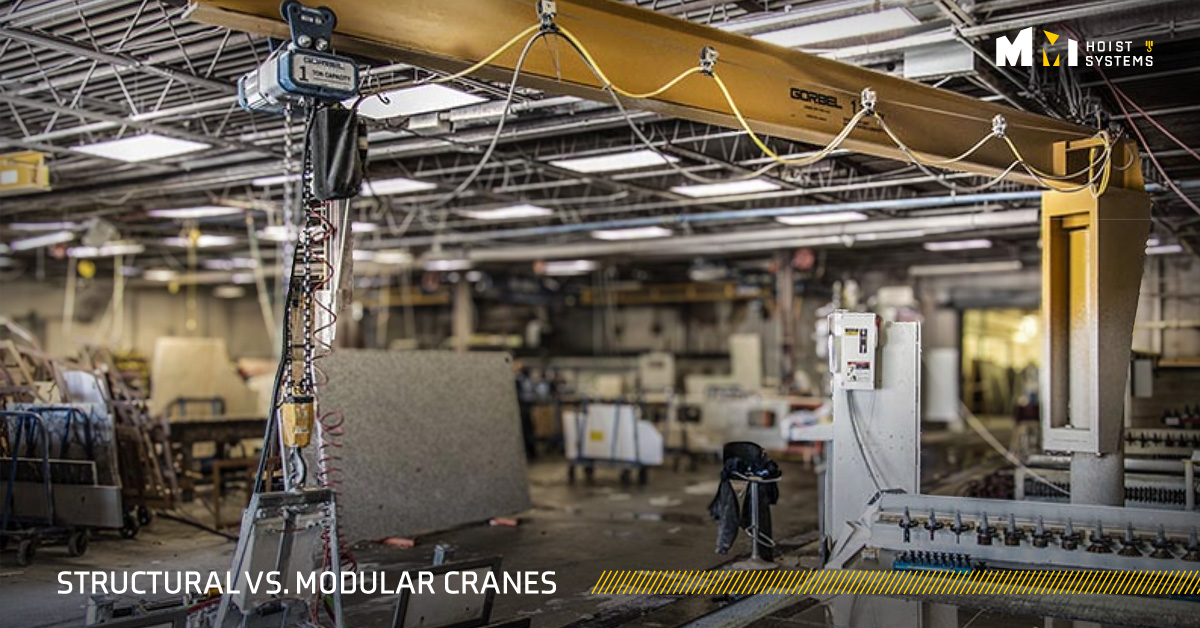When choosing a crane system for your business, one of the first big decisions to make will be whether you want a structural crane or a modular crane.
Each option offers unique advantages, and which one you choose will depend on your industry, facility layout, and operational needs. Understanding the differences between these crane types will help you make a decision that supports both your immediate requirements and long-term goals.
What Are Structural Cranes?
Structural cranes are custom-built systems designed for permanent installation within a facility. Typically constructed from heavy-duty steel and engineered to fit specific building dimensions, these cranes are tailored to meet specific load requirements and operational demands.
The key advantages of structural cranes include:
- High-capacity lifting: Structural cranes are built to handle heavy-loads reliably.
- Durability and stability: These cranes are designed to be safe and efficient, even with frequent, intensive use.
- Long-term investment: These systems, when properly maintained and operated, can provide decades of service.
- Customization: Every structural crane system is engineered around the facility’s exact needs and workflows, so it works perfectly with your space and your needs.
Disadvantages of structural cranes include:
- Installation: Structural cranes may take months to install.
- Upfront and expansion costs: These systems are more expensive to install and modify.
- Specialized training required: A custom system may require specific operator knowledge and training.
Structural cranes are typically a good fit for environments with intense, continuous lifting needs, such as manufacturing plants, steel production facilities, and heavy equipment maintenance.
What Are Modular Cranes?
Modular cranes are pre-engineered systems designed with flexibility and scalability in mind. Built from standardized components, they are easier to install, relocate, and expand.
The key advantages of modular cranes include:
- Flexibility: Can be modified or relocated as facility needs evolve
- Scalability: Businesses can start small and expand their crane system as needed
- Cost efficiency: Lower upfront costs and reduced downtime during installation
- Easy to maintain: Standardized parts simplify repairs and replacements.
Disadvantages of modular cranes include:
- Space utilization: Because modular cranes are not custom-built, they may not make the best use of available space.
- Lower load capacity: Modular cranes are generally designed for light/medium duty use, rather than extreme heavy lifting or 24-hour cycles.
Modular cranes are well-suited to growing businesses, facilities with changing layouts, or any situation where agility and adaptability is a top priority. This typically includes industries like warehousing, automotive, and general fabrication.
Which Crane is Right for Your Business?
The best choice for your business will depend on your operational priorities.
Choose a structural crane if you need:
- High-capacity lifting
- Around-the-clock use
- A permanent solution
- A customized solution
Choose a modular crane if you need:
- Adaptability
- Faster, easier installation
- Cost-efficiency
- The ability to expand as operations evolve
How MMI Hoist Systems Can Help
At MMI Hoist Systems, we understand that no two businesses are alike. Our experts can work with you to assess your lifting requirements, evaluate your facility layout, account for budget considerations, and consider plans for growth as we help you determine a crane solution that maximizes safety, productivity, and return on investment.
With years of experience in the industry and a deep understanding of crane and hoist systems, we’re the perfect partner to help you create your ideal setup.
Finding the right type of crane system is a strategic decision that can impact your operations for years to come. Whether you’re building a new facility or upgrading your current system, our team is here to guide you every step of the way.
Contact us today to schedule a consultation so you can discover which crane system will best support your business’s goals.
